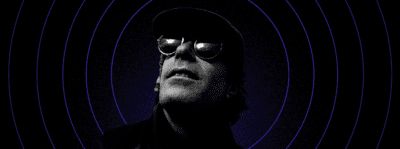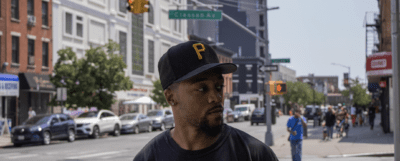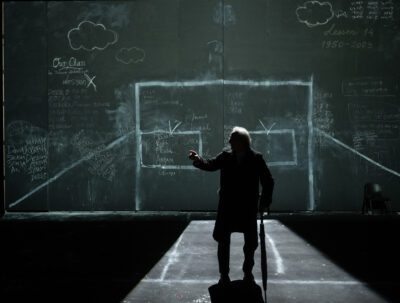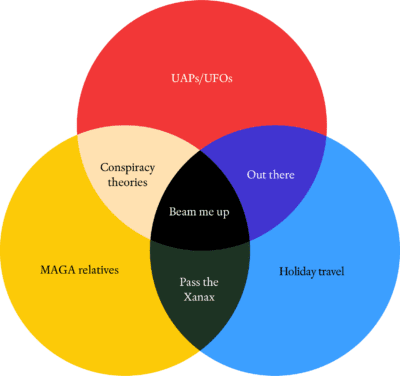“You, Forever” and Inspiration from the Outdoors
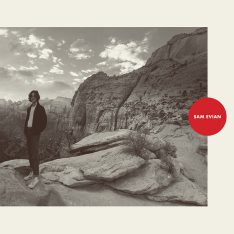 Sam Evian’s newest album “You, Forever” is his escape from a world of music making tied to backlit screens. A cross-country road trip with his girlfriend became a journey of partnership and shared awe, taking in the magnitude of the landscape and the experience of living outside. Out of this trip comes an album that combines themes of space, openness, togetherness, uncertainty, grit, and some slamming analog instrumentation. Recorded upstate in Woodstock, Sam kept his bandmates in the dark about the songs until they arrived at the secluded house-turned-studio. The resulting process valorizes spontaneity in music and gives the gift of thrilling imperfection. I caught Sam on the phone as he was boarding a flight back to the States from the UK, getting ready to play Brooklyn’s Northside Festival next week at Rough Trade. He spoke openly about fighting for his health while on tour, the changing scene in Brooklyn, and how he finds his “lizard brain” on stage.
Sam Evian’s newest album “You, Forever” is his escape from a world of music making tied to backlit screens. A cross-country road trip with his girlfriend became a journey of partnership and shared awe, taking in the magnitude of the landscape and the experience of living outside. Out of this trip comes an album that combines themes of space, openness, togetherness, uncertainty, grit, and some slamming analog instrumentation. Recorded upstate in Woodstock, Sam kept his bandmates in the dark about the songs until they arrived at the secluded house-turned-studio. The resulting process valorizes spontaneity in music and gives the gift of thrilling imperfection. I caught Sam on the phone as he was boarding a flight back to the States from the UK, getting ready to play Brooklyn’s Northside Festival next week at Rough Trade. He spoke openly about fighting for his health while on tour, the changing scene in Brooklyn, and how he finds his “lizard brain” on stage.
Hi Sam, Thank you for taking the time to chat. I understand that you’re on your way back from England right now?
This is true. Was my first time over there as a band; we had a week of shows. And there were a couple of pivotal moments that brought us over here. We had a BBC 6 session with Mark Riley. Which was a live interview and then we performed 3 songs off the record. Mark Riley is like a tastemaker type in the UK and he’s also just a really nice guy. He played in The Fall for awhile. He’s just really cool. We did that and then we did Great Escape festival, which is like CMJ, which is like a lot of upcoming bands. I don’t know if you ever went to CMJ but its pretty chaotic. Then we filled in the rest of the weeks with like club dates in other cities in the UK like Birmingham, Manchester, Leeds, went up to Glasgow for a night.
That’s awesome, that’s a really good tour of the UK.
I’ve only ever been to London before, and I was driving which was crazy because I’ve never driven on the opposite side of the road. Good way to see the country.
…the West, is such a timeless theme, it’s so easy to go out there and find yourself in awe of that landscape.
Is this band the same group you recorded the album with?
Yeah, the same group of guys. Brian Betancourt (bass), Austin Vaughn (drums), Adam Brisbin (guitar). What was cool about this tour is that Adam was already on tour with his girlfriend, Katie von Schleicher, and they’re from Brooklyn, and they both met us, and Katy played keyboard for a couple nights. Which was really fun.
You’ve been living in Brooklyn since 2011, and I’m curious to know how you feel that the scene has changed since then?
I do feel like the scene has changed quite a bit and it’s hard for me to feel connected to the scene any more. When I moved here, it was Death by Audio, 285 Kent, Glasslands, the original Silent Barn, Big Snow Buffalo Lodge, all these other venues, Cake Shop, man there were so many that we would play at all the time, when I was playing with my other band, Celestial Shore. You felt like every night there was someone playing at like an open platform DIY kind of space, and I think that was really fun you know? Well, so know all those spaces are gone. And I know that spaces have popped up over the years, and then they’ve closed, like Palisades, and the deeper out you go in Bed-Stuy and Bushwick, they’re opening kinda similar DIY spots, but they seem to be less frequent and more of a struggle to keep them open than it used to be. I feel less connected with that version of the New York music scene. That being said, there are still amazing musicians in Brooklyn and they’re not going anywhere. It feels less easy to go out and see them play. But maybe that’s a good thing, and they’re not over saturating, and you just pick the shows that you really want to see. And they’re at the more traditional Bowery type venues, so it’s more commercial. I’ve watched it shift.
Part of the visual aesthetic of the album is kind of a western, open space feel. Is that new for you?
Well, yeah getting out of the city was a big thing for me in making this record. We did it upstate in Woodstock in a house in the woods that I rented from a friend, I just brought gear up there, it wasn’t a studio or anything. My girlfriend and I, after a tour, we stayed in California and drove across the country together. It was a really poetic trip, we were anonymous and we weren’t on tour, and we got to stretch out and explore, which is the complete opposite of touring. And I was listening to Neil Young and Joni Mitchell, and these timeless artists and the landscape just settled with me, and it ended up informing the lyrics I wrote for the songs.
There’s a sense of space on the album.
Yeah space, and like themes of traveling and partnership. I mean the West, is such a timeless theme, it’s so easy to go out there and find yourself in awe of that landscape. We went to Zion National Park, which is this canyon north of the grand canyon, and its so beautiful, and that’s the picture of the over of the record. And it’s just an iPhone photo, but I thought it had this feel. It was such a heavy feeling to be there. I was hoping that the lyrics would reflect that.
Yeah, I think so. One thing that struck me when I was listening to it, is the heaviness of the sounds actually. It sounds like there’s more weight behind the drums, the guitars, more driving energy maybe, than there is in “Premium.”
Yeah I think overall, I’m feeling like putting more power into the sound of the recording. Through working on tape, but also just through playing with new guitar sounds and performance styles. The 2016 election cycle and the current climate in our system right now and the undermining of American democracy. All of that. It just leads to a heavier feeling, and when you’re playing an instrument, it just makes you want to play a little harder. You know, traveling around America, it instills this sense in you that some things should be a bit heavier. It was really fun to play the tunes in that house. And we did it in the moment – like I hadn’t taught the songs to the guys before, so we were going for that Neil Young – Crazy Horse vibe at times. It was so fun.
It’s surprising to hear that you hadn’t taught them the songs ahead of time. Does that tightness come from you guys knowing each other, or is it sort of like magic happened in that one moment?
I think it’s a bit of both. Touring together for the last couple of years has really tightened us up. As a band we have a sense for the way each of us feels time, and we can all anticipate each others’ movements in a way. So there is like a trust and a kind of musical bond that exists between us as a band. And you throw that into the chaos of learning something and responding to it. And I think it’s a nice blend of spontaneity and confidence.
Everyone needs to be provoked, everyone needs something to respond to, to be prompted.
Do you feel that the limitations you put on the recording process increased your spontaneity, or were you fighting against them?
I think they presented new opportunities. Everyone needs to be provoked, everyone needs something to respond to, to be prompted. It’s presenting little prompts along the way for the guys to respond to. I think it’s really important. Otherwise they’re left to their own devices, and its easy to get into an insecure headspace if you don’t have the distraction of a prompt. I think all the little limitations, no matter what they were, it’s just a little kernel of energy to focus on in those moments where you’re otherwise distracted by yourself. It’s an input-output experimentalism, I guess, there are these pieces of the puzzle and you don’t know how they will fit into each other until you put them out on the board. It’s fun to play around with. I think for the next record, I would introduce a whole new set of rules.
Rule making and then rule breaking I guess.
The rules that I had dreamed up for this are in inherent in the music that I appreciate and listen to all the time – music from the 60s and 70s. Those guys didn’t have the choice of those rules, but part of our job now is to create systems to work within, because everything is so multifaceted. The process of any art making these days is so open, you can do anything with anything, it’s easy to get lost in that. So I think rules and guidelines for creation are really important.
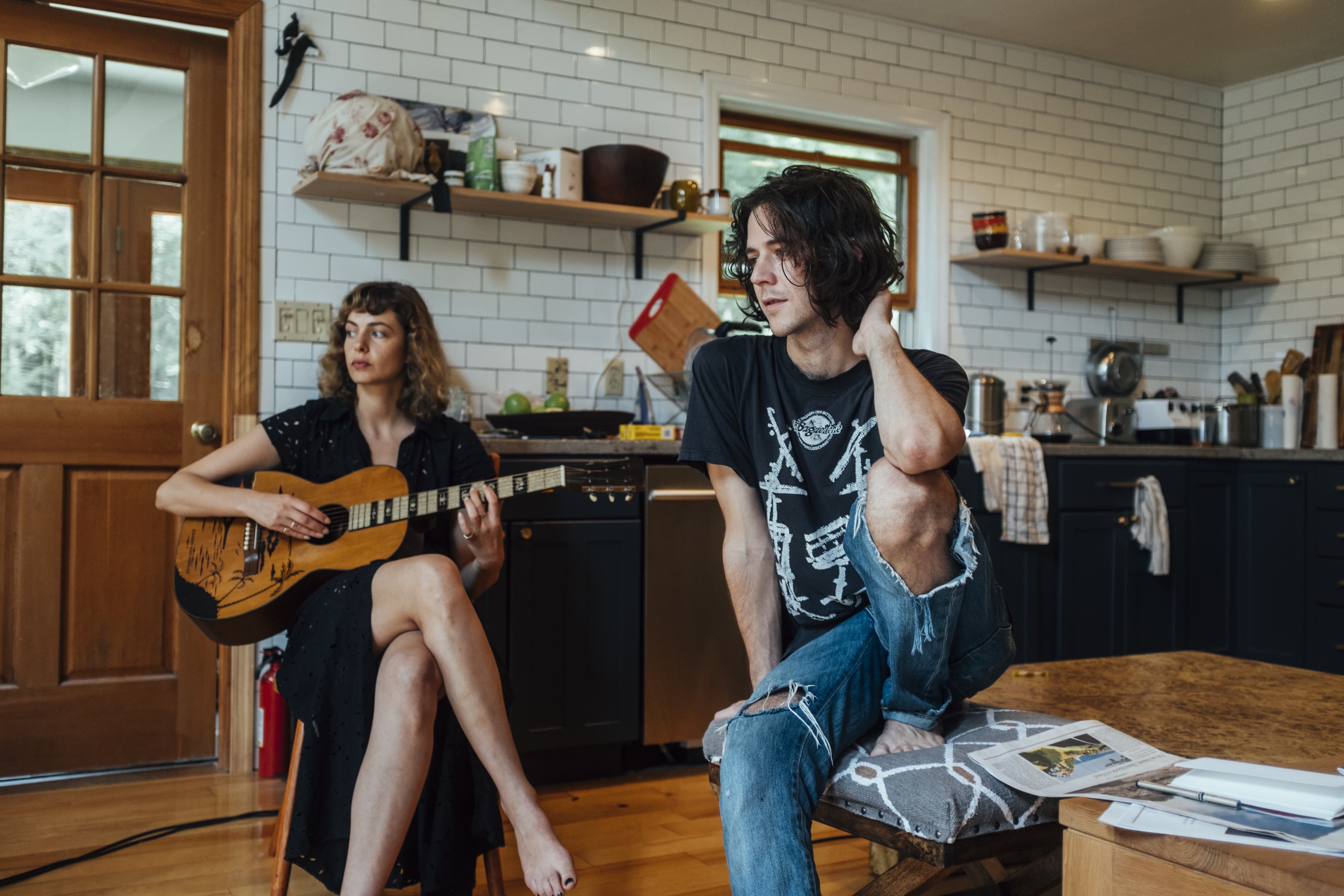

How does that play out in the recording process?
The tape machine is a big thing. I didn’t use a computer, which was fun. First of all, It was important for me to get off the screens. Before we went up there to make the record I was spending a lot of time on the computer just in day-to-day life. Just like everyone I suppose. But I wasn’t sleeping well, and the glowing rectangle vibe is something I need to get away from in regards to music. So the tape machine is kind of the only way to do that. So that’s why I chose it. It wasn’t really for any other reason than that. It’s just a different workflow.
To get your mind off the technology and on to the music.
Yeah and one benefit is that the tape sounds great. It’s a classic format. I think it’s something that everybody loves whether they know it or not, because the music we all love was made that way. Maybe I’ll make the next record on an iPad, you know, you never want to be too precious.
Live is such a different animal. Its like lizard brain. Or at least I hope.
Is it hard to let the engineering side of yourself go when you’re songwriting?
Yeah, essentially it’s important to let it go. But I think my process as a sound engineer is more oriented towards the entire thing. The techie, nerdy side … I will definitely get nerdy about certain gear choices likes microphones or preamps. But beyond that, I like to just let things fall into place. If something isn’t working, I’m really fast to just can it and try something else. I think the main thing is just to keep moving and not get bogged down in editing – the typical things we all do, like doing 15 million vocal takes, and over editing the drum parts. Because then I think you lose something. The song doesn’t quite get translated. I think it’s important to remember that when you over-edit things and focus too much on the actual physical recording, a lot of the stuff just gets totally lost. The honest imperfections that we all listen for in those records that are thrilling to find. Those are the things I want to keep.
How does that translate to playing live?
Live is such a different animal. Its like lizard brain. Or at least I hope. I play best when I get to my lizard brain self on stage. Which sometimes takes a couple of whiskeys. But if I can manage to drop my insecurities and just sing and play guitar everything falls into place. But the moment I start doubting myself, thinking about the sound too much, in that way there’s a parallel to the recording process. You just want to be yourself and trust your instincts, and I guess that’s how it goes live as well. But it’s still so different because you’re standing on a stage in front of people. It’s a real trip.
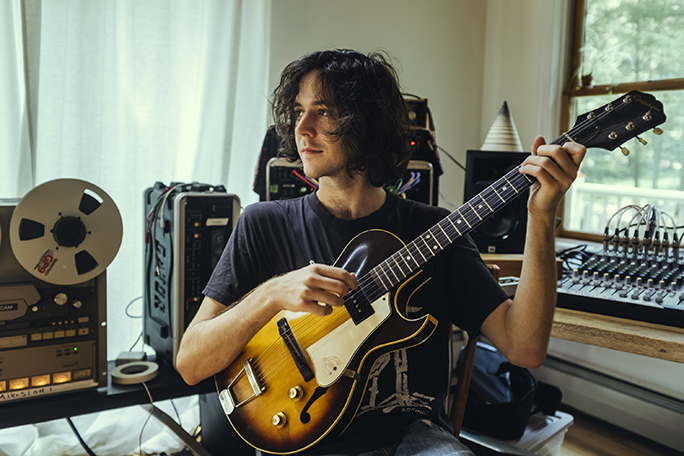

I read a Pitchfork review of “Health Machine” that called the song, “the sound of an artist sticking to the righteous path, even as the temptations of touring life threaten to lead him astray.” Does that ring true for you?
Well I think they really went with the health theme. And yeah, I totally feel that. It’s hard to take care of yourself. The greatest temptation is to treat yourself like garbage, eat bad food, to go out drinking and try to forget about your anxieties. Just the general craziness of uprooting your life and getting in a van for a month. But it’s your job as an artist to treat yourself well so you can be your best for the people who spend their time and money to see you do your thing. I appreciate that. So yeah, I’ve definitely been trying to really just take care of myself.
You can listen to Sam Evian’s new album “You, Forever” out June 1, 2018 here.
You can also purchase tickets to see Sam Evian play at the 2018 Northside festival here!
Photos by Josh Goleman.
You might also like 

















